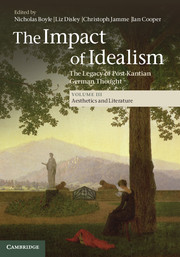Book contents
- Frontmatter
- Contents
- List of Illustrations
- List of Contributors
- Acknowledgements
- List of Abbreviations
- Introduction: Idealism in aesthetics and literature
- 1 The legacy of Idealism and the rise of academic aesthetics
- 2 Hegel's philosophical theory of action: the concept of action in Hegel's practical philosophy and aesthetics
- 3 Tragedy and the human image: German Idealism's legacy for theory and practice
- 4 Romanticism as literary Idealism, or: a 200-year-old way of talking about literature
- 5 Idealism in nineteenth-century German literature
- 6 Idealism in nineteenth-century British and American literature
- 7 Elements of Schopenhauer's thought in Beckett
- 8 German Idealism and the philosophy of music
- 9 The music of German Idealism
- 10 ‘Refiner of all human relations’: Karl Friedrich Schinkel as an Idealist theorist
- 11 Influences of German Idealism on nineteenth-century architectural theory: Schelling and Leo von Klenze
- 12 ‘Making a world’: the impact of Idealism on museum formation in mid-nineteenth-century Massachusetts
- 13 Hegel, Danto and the ‘end of art’
- Bibliography
- Index
- References
1 - The legacy of Idealism and the rise of academic aesthetics
Published online by Cambridge University Press: 05 December 2013
- Frontmatter
- Contents
- List of Illustrations
- List of Contributors
- Acknowledgements
- List of Abbreviations
- Introduction: Idealism in aesthetics and literature
- 1 The legacy of Idealism and the rise of academic aesthetics
- 2 Hegel's philosophical theory of action: the concept of action in Hegel's practical philosophy and aesthetics
- 3 Tragedy and the human image: German Idealism's legacy for theory and practice
- 4 Romanticism as literary Idealism, or: a 200-year-old way of talking about literature
- 5 Idealism in nineteenth-century German literature
- 6 Idealism in nineteenth-century British and American literature
- 7 Elements of Schopenhauer's thought in Beckett
- 8 German Idealism and the philosophy of music
- 9 The music of German Idealism
- 10 ‘Refiner of all human relations’: Karl Friedrich Schinkel as an Idealist theorist
- 11 Influences of German Idealism on nineteenth-century architectural theory: Schelling and Leo von Klenze
- 12 ‘Making a world’: the impact of Idealism on museum formation in mid-nineteenth-century Massachusetts
- 13 Hegel, Danto and the ‘end of art’
- Bibliography
- Index
- References
Summary
I.
To speak of ‘the legacy of Idealism’ is to combine two terms neither of which is unproblematic. The term ‘legacy’ was long compromised through discussion within the GDR of the maintenance of its cultural traditions; but these days it seems, particularly in a philosophical context, that once more it can be used in a fairly unembarrassed way (as is shown for example by Hegels Erbe (Hegel's Legacy), the book of essays edited by Halbig, Quante and Siep in 2004). My concern here will not be with the reconstruction of the influence of individual thinkers, but with their connections with one another, with the intellectual force field to which Dieter Henrich has given the name ‘constellations’ (Konstellationen). Within a very short time, in the two decades at the end of the eighteenth century, the structure of speculative Idealism arose. It shaped intellectual history and even today it sets a benchmark for philosophical thought – comparable only with what was achieved in the classical period of Athens and Florence. According to Rüdiger Bubner, in the introduction to Innovationen des Idealismus (1995, published in English as The Innovations of Idealism, 2003), we have today become accustomed
to seeing German Idealism as more than simply a particularly inspiring period in the history of philosophy. And despite increasing chronological distance, we regard idealism as exemplary because of its quick awareness of problems, intensive movements of ideas and prudent, which is to say, undogmatic formation of a political rationality.
Yet despite all the sustained interest in this philosophical epoch, it remains enormously difficult to agree what constitutes German Idealism at its core. Historically we have become accustomed to distinguish two phases of development: the critical phase and the speculative phase that followed it. But it is frequently pointed out, inter alia in Walter Jaeschke's inaugural lecture, that talk of ‘German Idealism’ is, for various reasons, not suited to be the name of an epoch, and that, in contrast, it would be preferable to speak of ‘classical German philosophy’.
- Type
- Chapter
- Information
- The Impact of IdealismThe Legacy of Post-Kantian German Thought, pp. 11 - 22Publisher: Cambridge University PressPrint publication year: 2013



